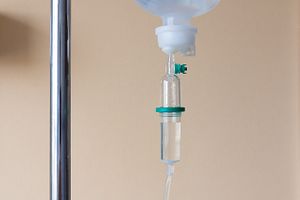China rang in the Year of the Pig with yet another medical scandal. On Tuesday, the first day of the new year according to the lunar calendar, China’s National Health Commission sent a statement to hospitals that a batch of intravenous immunoglobulin (IVIg) was suspected to have been contaminated with HIV, the virus that causes AIDS. The plasma had tested positive for the HIV antibody according to a provincial commission, and the national health authorities sent teams to do further tests.
South China Morning Post reports that “The faulty batch comprised 12,229 50ml bottles of plasma due to expire in June 2021.” The products involved have been sealed and medical institutions nationwide have been asked to stop using them while investigations continue, according to China’s official Xinhua News Agency.
IVIg is used to help people who have weakened immune systems, whether from an autoimmune condition like lupus or as a side effect of receiving bone marrow transplants. The product is made by collecting immunoglobulin from donated blood plasma; donors are generally strictly screened for diseases.
The IVIg in question was produced by Shanghai Xinxing, which is owned by China’s pharmaceutical giant Meheco Group. According to the South China Morning Post, Shanghai Xinxing is “China’s second-biggest medical blood products manufacturer.”
One unnamed Shanghai doctor cited in Chinese media said that patients who received a tainted IVIg infusion might not become infected with HIV because IVIg includes an anti-virus treatment. So far there have been no reported cases of any patients having become infected from the IVIg.
On Wednesday, a day after the original warning, Chinese authorities tried to reassure the public by announcing that further tests on a batch of the products in question have come up negative. A statement from the National Medical Products Administration (NMPA) said tests for HIV, hepatitis B, and hepatitis C all turned out negative.
Public faith in China’s health regulators has been shaken by previous scandals. Most recently, the company Changsheng Life Sciences was found to have falsified production records for its rabies vaccine, and regulators were accused of not acting quickly enough to penalize the firm. As part of the fallout, four former officials with the China Food and Drug Administration – the body above the NMPA — are being investigated for corruption.
Public outrage over medical scandals has alarmed the leadership of the ruling Communist Party, moving it to respond more quickly and firmly than in the past, including bringing criminal charges and billion dollar fines. One of the biggest scandals, which broke in 2016, saw roughly 2 million improperly stored or expired vaccines used on thousands of Chinese children over five years. That news sparked outrage and fear among China’s parents, many of them in the country’s growing middle class.
This week’s particular scandal recalls a massive HIV outbreak caused by lax sanitation procedures for plasma donations and transfusions. During the 1990s and early 2000s, thousands of Chinese were infected with HIV when they sold or received transfusions of tainted blood products. According to China’s Ministry of Health, over 40 percent of people who gave blood at illegal centers – which numbered in the hundreds – became infected with HIV. Towns that were particularly hard-hit, many in Henan province, became known as “AIDS villages.”
“The root of AIDS in China was the plasma market,” Gao Yaojie, a doctor who helped uncover the cause of the epidemic, told the New York Times in a 2016 interview.
“This was a man-made catastrophe. Yet the people responsible for it have never been brought to account, nor have they uttered a single word of apology.”
The Associated Press contributed reporting to this story.

































